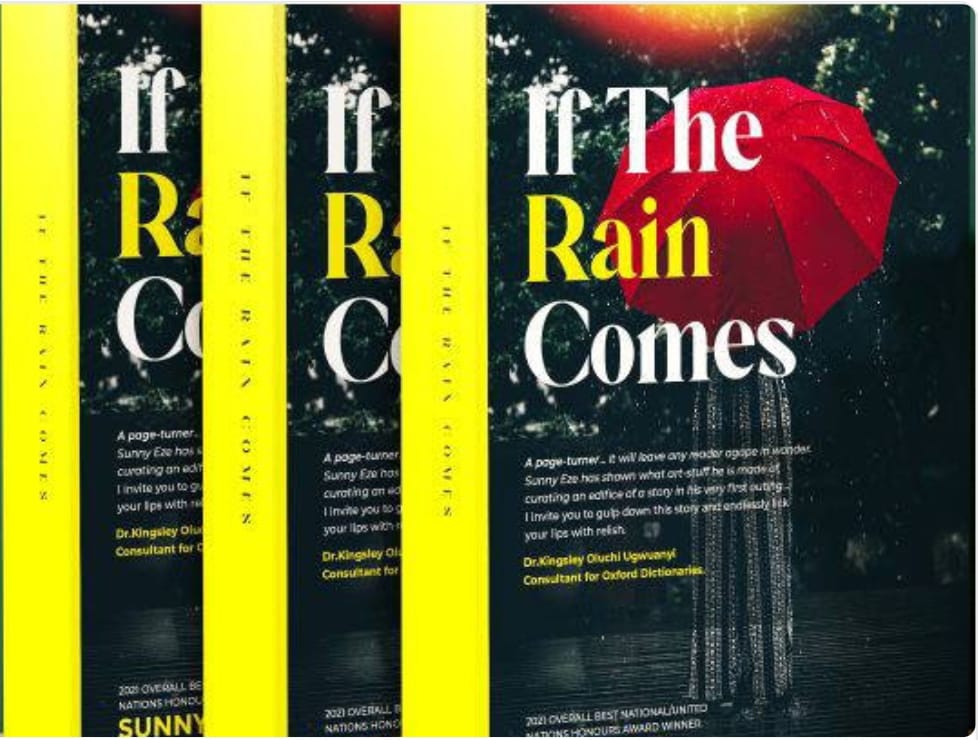We are victims of evil customs – Muhammad Ali Jinnah
(A review of Sunny Eze’s If the Rain Comes, Kraft Books)
By Olayinka Oyegbile
Society has from time immemorial been shaped by the ideas of leaders, never mind that they (the leaders) always say they are there on behalf of the people. This is what the Marxists call ‘the idea of the ruling class’. It is, therefore, what the leaders of a society determine that form the ethos and laws of such a society. That is why what is law in a particular land might be unlawful in another. The history of the world has therefore been shaped by the whims and caprices of those who find themselves in the corridors of power. Due to this, man begins to move from one part of society to another in search of better laws that suit his or her life pattern.
Leaders try to force or persuade people to see life through their own prisms. This has led to the growth or decay of society depending on what they choose. The choice that society makes determines how it will progress or in the direction, it moves—this clash of will and choice to perhaps go a different route engineers the progress of society.
In Nigeria of old before the advent of colonialism, the birth of a twin was viewed as a taboo. Any family that gives birth to twins knows what fate will befall such. This is the kernel of the story written by Sunny Eze, a medical doctor, in his debut novel If the Rain Comes. In this story intrigues meets cunny and the stage is set for a grand clash.

Mary Slessor, the famous Scottish missionary who helped to stop the common practice of killing twins in some southern parts of the country easily comes to mind as one reads through this novel, which is also dedicated to her and the legal petrel Chief Gani Fawehinmi “and all others who have raised their voices for ‘a chance’ to the sons and daughters of Africa,” according to the author.
For a very long time in the village of Umuaroko, twins have been cast out and their lives taken. However, it takes the decision of one person, one of the leaders who had presided over the fate of others’ twins to be affected before things move closer home and rules had to change. The rule had to be stylishly changed and manipulated through many turns and twists to allow this rather rash decision to be reviewed.
The reason for the killing of twins was never debated nor reasoned until the relation of one of the clan leaders had one and it became a tough decision to take. A leader who has had many wives who had delivered boys all through and now had a wife who delivered a set of female twins! Selfishness sets in because the man now knows that the strings of boys, he had would get married and one day face their families, whereas the girls even when they get married would not turn their backs on their parents. Female children take care of their parents more than the male, they believe.
The dilemma was how to go about the change of tactics without the decision affecting the position of the leader. If the leader of the clan goes against the wishes of the clan, he has to vacate his position or pay for it, one way or the other. It was the same way Okonkwo had to pay with his life when he chose a path that the society he thought he was fighting for took a different route. Will he now sacrifice his position for trying to change the rule?
This is captured in the statement of one of the leaders: “If you say so. But are you sure there is not more to this?” the elder asked and watched Uduma look away. Then he went on to make his summation: “When we tell this story to coming generations, we would point out that this day wasn’t just about the killing of twins, but more importantly, it was about how the interests of men in power had shaped this land for good and for bad.”
The author has with the benefit of hindsight written a novel that is a chronicle of the time when Nigerians, in observance of a crude custom resorted to the killing of twins. He has without resorting to passing any judgement been able to let readers understand that it is important to know what drives a tradition or decision and what leads to such. It is important to note that the decision to jettison the idea of killing twins was unilateral, the decision of a few.
If the Rain Comes is an allegory about the state of being in Nigeria, taking a look at what happens and how decisions are arrived at. How are the populace taken into consideration when decisions are made? Are such arrived at for their benefits or for that of some selected few? Eze with this debut has contributed to this life long debate.


